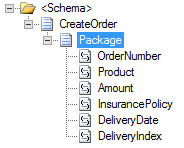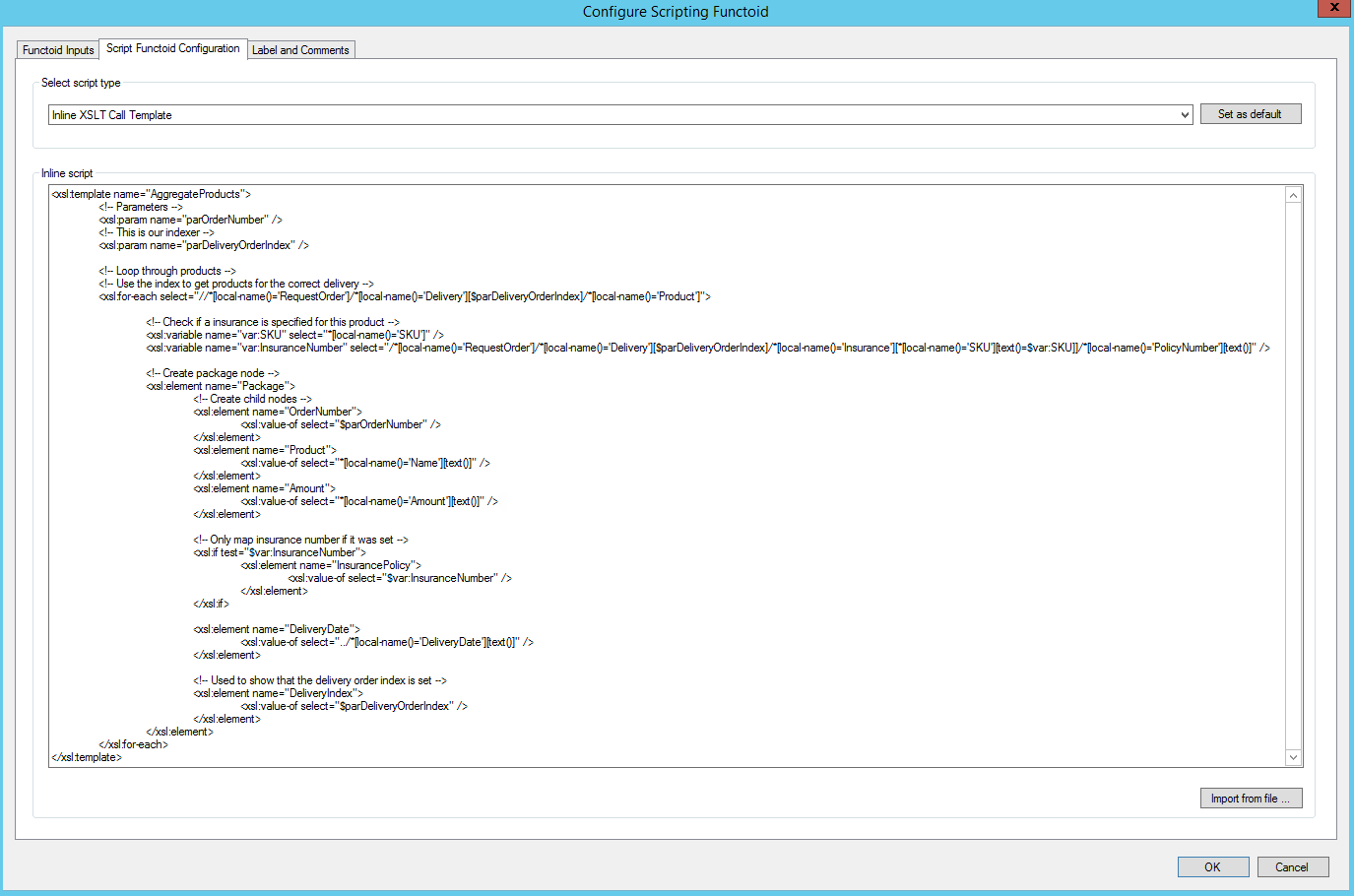BizTalk Server: Using index parameter in Inline XSLT Call Template
Introduction
When developing maps with BizTalk, we have several options to map our data. We can of course use the mapper functionality itself, but sometimes we will find this will not give us the required flexibility we need. Luckily the BizTalk mapper gives us the ability to use our own code using things like inline C#, XSLT, XSLT call templates etc. When using inline xslt call templates, we might want to use a XPATH expression to gather the data we need, but there is a small caveat if we want to use an indexer in expression.
Scenario
To explain this, we will use a scenario where we map our message using an inline xslt call template. The incoming message represents an order with multiple deliveries, each with multiple products and an optional insurance for the products. Note that this is a simplified scenario which we could also solve in other ways, even just using mapping functionalities, but this is just to show one way of doing this.
These should be merged in the outgoing message. We will add the node DeliveryIndex here, to help us debug the map later on.
Our XSLT Template
Let's create the XSLT template which we will use to map our products.
<xsl:template name="AggregateProducts">
</xsl:template>
We will start by assigning 2 parameters, one for the order number, and another for an indexer which we will use to loop through the products for a delivery.
<xsl:param name="parOrderNumber" />
<xsl:param name="parDeliveryOrderIndex" />
Now use an xpath expression to get the delivery order we are currently working on, and loop through it's products. This is where we will be using our index parameter.
<xsl:for-each select="//*[local-name()='RequestOrder']/*[local-name()='Delivery'][$parDeliveryOrderIndex]/*[local-name()='Product']">
</xsl:for-each>
We will need to check if an insurance was set for this product as well.
<xsl:variable name="var:SKU" select="*[local-name()='SKU']" />
<xsl:variable name="var:InsuranceNumber" select="/*[local-name()='RequestOrder']/*[local-name()='Delivery'][$parDeliveryOrderIndex]/*[local-name()='Insurance'][*[local-name()='SKU'][text()=$var:SKU]]/*[local-name()='PolicyNumber'][text()]" />
And finally, we will create our package node with it's subnodes.
<xsl:element name="Package">
<xsl:element name="OrderNumber">
<xsl:value-of select="$parOrderNumber" />
</xsl:element>
<xsl:element name="Product">
<xsl:value-of select="*[local-name()='Name'][text()]" />
</xsl:element>
<xsl:element name="Amount">
<xsl:value-of select="*[local-name()='Amount'][text()]" />
</xsl:element>
<xsl:if test="$var:InsuranceNumber">
<xsl:element name="InsurancePolicy">
<xsl:value-of select="$var:InsuranceNumber" />
</xsl:element>
</xsl:if>
<xsl:element name="DeliveryDate">
<xsl:value-of select="../*[local-name()='DeliveryDate'][text()]" />
</xsl:element>
<xsl:element name="DeliveryIndex">
<xsl:value-of select="$parDeliveryOrderIndex" />
</xsl:element>
</xsl:element>
The full code for the template is as following:
<xsl:template name="AggregateProducts">
<!-- Parameters -->
<xsl:param name="parOrderNumber" />
<!-- This is our indexer -->
<xsl:param name="parDeliveryOrderIndex" />
<!-- Loop through products -->
<!-- Use the index to get products for the correct delivery -->
<xsl:for-each select="//*[local-name()='RequestOrder']/*[local-name()='Delivery'][$parDeliveryOrderIndex]/*[local-name()='Product']">
<!-- Check if a insurance is specified for this product -->
<xsl:variable name="var:SKU" select="*[local-name()='SKU']" />
<xsl:variable name="var:InsuranceNumber" select="/*[local-name()='RequestOrder']/*[local-name()='Delivery'][$parDeliveryOrderIndex]/*[local-name()='Insurance'][*[local-name()='SKU'][text()=$var:SKU]]/*[local-name()='PolicyNumber'][text()]" />
<!-- Create package node -->
<xsl:element name="Package">
<!-- Create child nodes -->
<xsl:element name="OrderNumber">
<xsl:value-of select="$parOrderNumber" />
</xsl:element>
<xsl:element name="Product">
<xsl:value-of select="*[local-name()='Name'][text()]" />
</xsl:element>
<xsl:element name="Amount">
<xsl:value-of select="*[local-name()='Amount'][text()]" />
</xsl:element>
<!-- Only map insurance number if it was set -->
<xsl:if test="$var:InsuranceNumber">
<xsl:element name="InsurancePolicy">
<xsl:value-of select="$var:InsuranceNumber" />
</xsl:element>
</xsl:if>
<xsl:element name="DeliveryDate">
<xsl:value-of select="../*[local-name()='DeliveryDate'][text()]" />
</xsl:element>
<!-- Used to show that the delivery order index is set -->
<xsl:element name="DeliveryIndex">
<xsl:value-of select="$parDeliveryOrderIndex" />
</xsl:element>
</xsl:element>
</xsl:for-each>
</xsl:template>
Creating the map
Now we will create the map, and add a script functoid in which we add use the template we just created.
For the first parameter, we will use the ordernumber as input to the functoid. For the second parameter (the indexer) we will use an iteration functoid, which will loop over the delivery nodes. Our output will be sent to the Package node.
We will use the following input for our tests.
<ns0:RequestOrder xmlns:ns0="http://Eldert.BizTalk.InlineXSLTWithIndexer.Schemas.RequestOrder/2016/10">
<OrderNumber>1</OrderNumber>
<Delivery>
<DeliveryDate>2016-10-25</DeliveryDate>
<Product>
<Name>First Product</Name>
<Amount>10</Amount>
<SKU>123456</SKU>
</Product>
<Product>
<Name>Second Product</Name>
<Amount>5</Amount>
<SKU>654321</SKU>
</Product>
<Product>
<Name>Third Product</Name>
<Amount>1</Amount>
<SKU>456789</SKU>
</Product>
<Insurance>
<SKU>456789</SKU>
<PolicyNumber>123456789</PolicyNumber>
</Insurance>
<Insurance>
<SKU>123456</SKU>
<PolicyNumber>987654321</PolicyNumber>
</Insurance>
</Delivery>
<Delivery>
<DeliveryDate>2016-10-28</DeliveryDate>
<Product>
<Name>First Product</Name>
<Amount>200</Amount>
<SKU>123456</SKU>
</Product>
<Product>
<Name>Third Product</Name>
<Amount>50</Amount>
<SKU>456789</SKU>
</Product>
<Insurance>
<SKU>456789</SKU>
<PolicyNumber>123456789</PolicyNumber>
</Insurance>
</Delivery>
</ns0:RequestOrder>
Now when we test our map, we would expect 5 packages in total, 3 for the first delivery, and 2 for the second, with the insurance policy node set on 3 of the packages. However, if we look at our output, we have 10 packages. Upon further investigation, we will find out that each package has been created for each delivery, so in this example 5 packages times 2 deliveries because the indexer is not taken into account.
The reason our indexer is not taken into account is because an XPATH expression needs its indices to be an integer, and currently our parameter is treated as a string.
Luckily this can be easily fixed, by calling the number() function on our parameter. Change this in the following 2 lines.
<xsl:for-each select="//*[local-name()='RequestOrder']/*[local-name()='Delivery'][number($parDeliveryOrderIndex)]/*[local-name()='Product']">
<xsl:variable name="var:InsuranceNumber" select="/*[local-name()='RequestOrder']/*[local-name()='Delivery'][number($parDeliveryOrderIndex)]/*[local-name()='Insurance'][*[local-name()='SKU'][text()=$var:SKU]]/*[local-name()='PolicyNumber'][text()]" />
Now if we retest our map, we will get the expected output.
<ns0:CreateOrder xmlns:ns0="http://Eldert.BizTalk.InlineXSLTWithIndexer.Schemas.CreateOrder/2016/10">
<Package>
<OrderNumber>1</OrderNumber>
<Product>First Product</Product>
<Amount>10</Amount>
<InsurancePolicy>987654321</InsurancePolicy>
<DeliveryDate>2016-10-25</DeliveryDate>
<DeliveryIndex>1</DeliveryIndex>
</Package>
<Package>
<OrderNumber>1</OrderNumber>
<Product>Second Product</Product>
<Amount>5</Amount>
<DeliveryDate>2016-10-25</DeliveryDate>
<DeliveryIndex>1</DeliveryIndex>
</Package>
<Package>
<OrderNumber>1</OrderNumber>
<Product>Third Product</Product>
<Amount>1</Amount>
<InsurancePolicy>123456789</InsurancePolicy>
<DeliveryDate>2016-10-25</DeliveryDate>
<DeliveryIndex>1</DeliveryIndex>
</Package>
<Package>
<OrderNumber>1</OrderNumber>
<Product>First Product</Product>
<Amount>200</Amount>
<DeliveryDate>2016-10-28</DeliveryDate>
<DeliveryIndex>2</DeliveryIndex>
</Package>
<Package>
<OrderNumber>1</OrderNumber>
<Product>Third Product</Product>
<Amount>50</Amount>
<InsurancePolicy>123456789</InsurancePolicy>
<DeliveryDate>2016-10-28</DeliveryDate>
<DeliveryIndex>2</DeliveryIndex>
</Package>
</ns0:CreateOrder>
Code
The sample code with this article can be downloaded from here.
See Also
Another important place to find an extensive amount of BizTalk related articles is the TechNet Wiki itself. The best entry point is BizTalk Server Resources on the TechNet Wiki.
Eldert Grootenboer, en-US, Event Hubs, Has code Sample, has image, has See Also, Has TOC, Logic Apps, Service Bus, Stream Analytics



